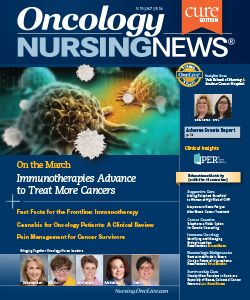Spotlight on Integrative Oncology Navigation
Using integrative modalities such as behavior therapies, mindfulness meditation and creative arts therapy can support a patient with cancer during treatment.
Laura Galindez, MSW

Laura Galindez, MSW
Any healthcare provider who works in oncology can attest that almost all patients will experience some side effects which affect their quality of life. There is also the smaller subset of patients who have extreme reactions to treatment.
As difficult as these challenges may be, patients’ best chances for survival are increased when they can tolerate most of their treatment course. By supporting patients physically and emotionally, integrative oncology services such as acupuncture, meditation, yoga, and more can be an important component of treatment.
For those patients who already subscribe to a holistic lifestyle, having someone on their care team who will advocate for these types of interventions can make them feel heard and supported. In my role as an integrative oncology patient navigator, I seek to help patients be proactive in their self-care and manage their side effects.
Managing Grueling Side Effects Holistically
PC is a 55 year old Caucasian woman diagnosed with stage I right breast cancer. She had breast conservation surgery, and pathology showed a 2.1 cm triple-negative tumor, 0/6 sentinel nodes, and final margins negative for invasive cancer. Her cancer was detected early and managed conservatively with surgery—an optimal outcome.
This patient was an active participant in her care and sought me out for holistic recommendations. As a professor of holistic health, she was already very health-conscious and used yoga and meditation to support her emotional health. She was also a member of a supper club where groups gather and share potluck-style organic meals and recipes, and she requested a consultation with our dieticians.
When PC began her chemotherapy treatments, however, she began to have complications. Going from being an above-average healthy person to being so sick—due not to her cancer, but her treatments—proved to be psychologically overwhelming, and she reached out to me to discuss holistic options for managing her side effects.
After her lumpectomy, adriamycin-cyclophosphamide (AC) was given for the first month. She had a negative reaction to the first dose, developing neutropenia and fever and ulcerations in her mouth; thus, her next 3 cycles were given at a reduced dose. By the fourth cycle, she had mucositis and painful hemorrhoids. The AC was discontinued.
Taxol was given next and was complicated by acute digital, cutaneous, and musculoskeletal toxicity. PC experienced sores all over her body—affecting her mouth, hands, and feet. Her pain was so severe that the treatment was replaced with a 10-week regimen of taxotere.
The patient found comfort through Reiki (healing touch) during her infusions to help with her extreme anxiety about side effects, and I met with her again to assess how we could further support her. She continued with yoga and sustained her mindfulness practice, finding these interventions helpful in coping with her difficult treatments.
However, as a mother of 3, she still felt stretched thin with caregiving duties. She attended a “Stress Management for Breast Cancer” workshop at our center, and together we put together an action plan to emphasize time for self-care and asking for more assistance from her children.
She received three doses of taxotere, but this also proved to be intolerable, and she developed burning rashes on her face and peeling hands and feet. Taxotere was discontinued, and at this point she was advised to consult Palliative Care for symptom management, which I helped to arrange. Her acupuncturist provided dietary recommendations that were reviewed by our dieticians for safety.
We nominated PC to attend an integrative “Wellness Day,” given by a local breast cancer-nonprofit organization, where she received vouchers to redeem for integrative modalities, as well as a community-supported agricultural share of organic vegetables delivered every other week for the season. She used her vouchers to pursue massage therapy.
PC received no further adjuvant systemic therapy thereafter and began radiation treatments. She experienced severe fatigue and mucositis during radiation, along with a recurrence of the blistering, peeling skin. She completed the radiation course; however, by this time she had significant emotional distress and reached out to for coping strategies.
Deploying Symptom-Specific Approaches
Having been encouraged by her team to share her emotions more openly, she attended a writer’s workshop where she could work through her experiences with the help of both writing coaches and social workers. She immediately connected with this outlet and became an active member of the monthly group. She also agreed to speak with our counselor for individual support as she moved into survivorship. She enrolled in a clinical trial for insomnia, which tested the efficacy of acupuncture versus what she received: cognitive behavioral therapy for insomnia.
Finally, even posttreatment, PC experienced significant neuropathy, which she described as “electric shocks” throughout her whole body, triggered by temperature, jostling, or even loud noises. At this point, I connected her to our cancer physiatrist, who prescribed an antidepressant to help with this unusual form of neuropathy. She reported that her insomnia had also improved, and she was sleeping approximately 6 hours a night versus the 2-3 hours she slept previously.
This case is an example of how using integrative modalities can support a patient during treatment. PC is very sensitive to medications. For some issues where she could have been prescribed more medication (eg, for insomnia), she used behavioral therapies instead. To help manage the anxiety-provoking effects of the chemotherapy, she was able to use mindfulness meditation. To connect with others and process her emotions, she utilized creative arts therapy (writer’s workshop).
Integrative therapies helped PC get through a tough course of medication, and she is now cancer-free.
Laura Galindez, MSW, is the integrative oncology patient navigator at the Abramson Cancer Center in Philadelphia, Pennsylvania, where she has combined her experience as a holistic health coach and social worker to support patients in body, mind, and spirit during the cancer journey.

Nurse Practitioners Weigh in on Data From the San Antonio Breast Cancer Symposium
January 16th 2023Loyda Braithwaite, MSN, RN, AGPCNP-BC, AOCNP; and Jamie Carroll, APRN, CNP, MSN, highlight presentations from the 2022 San Antonio Breast Cancer Symposium that will influence oncology nursing practice.
Nurse Practitioners Weigh in on Data From the San Antonio Breast Cancer Symposium
January 16th 2023Loyda Braithwaite, MSN, RN, AGPCNP-BC, AOCNP; and Jamie Carroll, APRN, CNP, MSN, highlight presentations from the 2022 San Antonio Breast Cancer Symposium that will influence oncology nursing practice.
Latest Conference Coverage
2 Commerce Drive
Cranbury, NJ 08512
All rights reserved.


